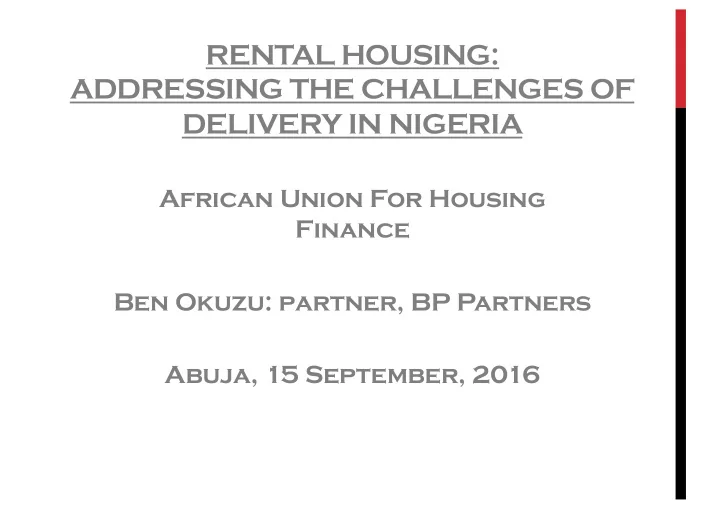

RENTAL HOUSING: ADDRESSING THE CHALLENGES OF DELIVERY IN NIGERIA African Union For Housing Finance Ben Okuzu: partner, BP Partners Abuja, 15 September, 2016
INTRODUCTION u Rental housing is often left out of housing conversation especially at policy level u 17 Million-unit deficit in Nigeria. Deficit is not all ownership driven, but policy narrative would suggest otherwise u Lack of rental housing policy u Rapid rate of urbanization resulting in severe housing shortage in urban centers
URBANIZATION AND EFFECTS ON HOUSING Urban housing shortages are not unique to Africa. In fact, it is a problem that persists globally because of the rate at which the world is urbanizing. GLOBAL GROWTH AFRICAN GROWTH 60% 50% 50% 40% 40% 30% 30% 20% 20% 10% 10% 0% 0% 2015 2050 2015 2030 Source: AfDB
THE RENTAL HOUSING MARKET u Urban environments world wide have a high proportion of renters (NYC: 26% home ownership rate against a national average of 64%) u 46% of Nigerians live in urban centers and 85% are in rented accommodation u UN Habitat: v Tenants by Choice: Those who choose to rent for reasons of mobility or temporary residence v Tenants by Constraint: Those who do not have the means to own their home. This second category makes up the majority of urban dwellers. u High Demand For Rental Housing: v The number of urban households seeking rental accommodation will continue to grow in the face of home prices increasingly out of the reach of the average Nigerian urban dweller.
THE RENTAL HOUSING MARKET (CONT .) With such high demand, why is the market not producing rental housing? The answer lies in understanding the dynamics of the housing market in Nigeria. THE SUPPLY METHOD: u Formal delivery v Structured to drive scale u Informal delivery v Haphazard v Supply in Nigeria is mostly informal.
THE RENTAL HOUSING MARKET (CONT .) MARKET FUNDAMENTALS u Prevailing Rents and Effects On Supply v Rents are insufficient to drive widespread investment in rental property by individuals u Financing v High interest rates, short tenors, and the absence of multi- family mortgages v Banks reluctant to provide multi-family mortgages. Tend to favor transactions with short turnaround time u Equity Investments v Conventional financing in Nigeria requires equity investments that range from 30% to 50%
ADDRESSING THE ISSUES SUPPLY u Shift from informal to formal methods of delivery u Government support for alternative funding structures for market driven production for the middle income group u Government subsidies for social housing for low income group
ADDRESSING THE ISSUES (CONT .) FINANCING u Banks should offer multi-family mortgages for rental developments u Expand the role of Federal Mortgage Bank to include multi-family mortgages u Pension capital (N5.4 trillion) can invest in revenue bonds to fund rental housing
ADDRESSING THE ISSUES (CONT .) EQUITY INVETSMENTS u Use Tax credits (Remission) to fund equity in rental development v Enables government to leverage future tax collection v Used extensively in the US v Used for the first time in Nigeria on a recent PPP project. Government has indicated its willingness to consider similar arrangements
RENT-TO-OWN (RTO) u RTO is being considered a gateway to home ownership u Limited in its ability to address home ownership for 2 reasons: 1. Who bears the financing costs during the rental period? 2. Are prevailing rents sufficient to support debt service?
CONCLUSION u Market fundamentals are producing strong headwinds for rental housing production u South Africa provides an example of successful rental housing delivery u Housing, particularly rental housing should be classified as infrastructure. Wikipedia provides an interesting definition of infrastructure as “ The physical components of interrelated systems providing commodities and services essential to enable, sustain, or enhance societal living conditions.”
THANK YOU
Recommend
More recommend